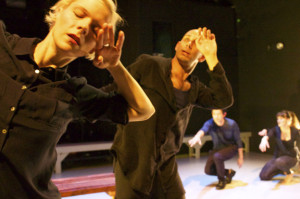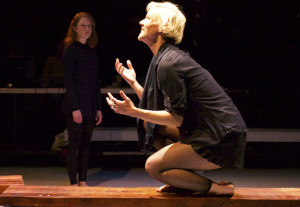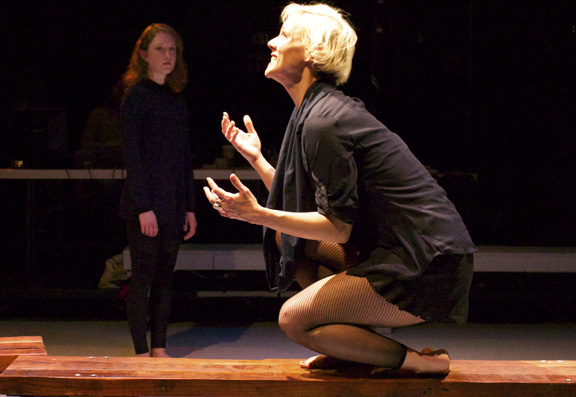This March, San Francisco’s Cutting Ball Theater stages a new translation of Sophocles’ “Antigone.” Directed by Paige Roberts, the production is visually dynamic and creatively staged, but both of those elements occasionally overwhelm and distract from the story itself.

The movement is a huge part of “Antigone,” incredibly specific and almost a character on its own. Symbolic dance movements fill scene transitions, the entire cast as an ever-present chorus using primarily arm and hand movements in their interpretative dancing. Here, the chorus sometimes sings together in solemn and harmonious melodies; when they don’t, sound designer Cliff Caruthers underscores the transitions with similar music. Heather Basarab does a fantastic job with the evocative lighting. Aside from design, the chorus uses only their bodies and two benches, rearranged in various configurations, to transform the small, intimate space.
But in a production where movement matters so much, every small detail is noticed. When Jason W. Wong as Kreon, the King, adjusts his shirt after a dance interlude, it sticks out. Or is he Kreon at that moment? Every actor is part of the chorus, which can get confusing. In fact, only Emma Crane Jaster’s physicality is clear and distinct enough from one character to another that it is abundantly clear whom she is playing when, always.

Indeed, Jaster is a standout – from her hilarious, rambling turn as a nervous sentry explaining to the King that the first watchman failed and someone came and buried Polyneices’ body against his royal decree to her wise and sorrowful Eurydice. Madeline H.D. Brown is powerful and determined as Antigone, her clear voice and strong presence filling the space. As Haemon, Wiley Naman Strasser is full of dynamic emotion bubbling underneath his words and threatening to spill over until it does in his final declaration that he is no longer Kreon’s son.

In the end, we never fully feel the scope of the loss. Antigone. Haemon. Eurydice. When these characters, portrayed by the three most moving actors in this production, died, it could have meant so much more to us. We could have felt their losses emotionally. Instead, we puzzle through the meanings of the dances and observe them slip into the chorus after their deaths, never getting a chance to connect or mourn. The eight actors speak as one again, and we focus on garnering meaning from a sea of gravely delivered vowels and consonants.
In fact, it feels like this production continually takes itself very seriously. Perhaps its sole attempt at fun occurs in a chaotic interlude where the actors all run around – this feels like a theater game, but it doesn’t do much to further the story. This is a common theme throughout “Antigone.” The dance, sound, lights, and staging are often creative and interesting on their own, but sometimes seem disjoint from the story itself. Ultimately, Roberts’ “Antigone” is a beautifully visual night at the theater.
“Antigone” runs through March 29 at the Cutting Ball Theater. Tickets are available here; free student rush tickets are also available 30 minutes before each performance.
Contact Noemi Berkowitz at noemi11 ‘at’ stanford.edu.
